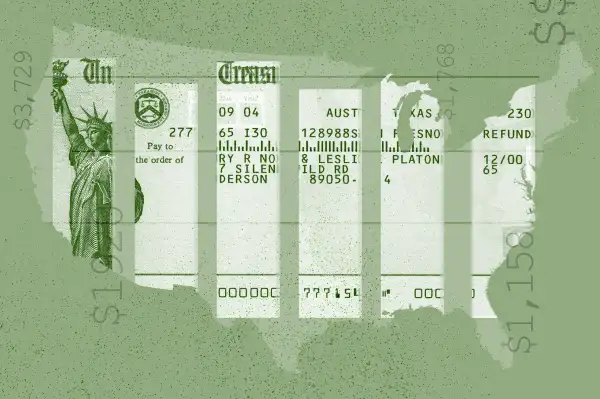Here's the Average Tax Refund Americans Got This Year. See How Yours Stacks Up

Happy Tax Day! If you’re one of over 100 million Americans who filed their taxes on time, you’re off the hook for another year — and chances are you got some money back along the way.
But how does your refund compare to your fellow Americans’? With the new tax laws and the general confusion around tax season, it might be hard to tell if what you’re getting is ...normal.
According to the most recent figures shared by the Internal Revenue Service, the average refund for the 2019 tax season was $2,833 — enough to pay for two months of the average rent price in the U.S., or perhaps a weeklong trip overseas, instead. Of course, not everyone got the same slice of the $220-plus billion pie. A more granular breakdown shows that the largest refunds were delivered in February, particularly in the week ending February 22, 2019.
If your refund is higher or lower than the average shown for the week you filed, don’t panic: these numbers were based on millions of refunds, and can vary drastically from person to person. Your individual refund, or lack thereof, depends on the number of allowances you claimed in the last year at your job. The more money your employer held back per paycheck, the more you get back when you file your taxes.
There's also a good chance that your refund is different than it's been for the last couple of years, even if your marital status, job, and location have all stayed exactly the same. In fact, it might be the first year since you started doing your taxes that you actually owe money instead.
The Trump administration passed new tax laws at the end of 2017 that changed the way Americans are taxed, how they file and, as a result, how much they’ll get out of their refund. You might have seen more money on each paycheck in 2018. That's because this is the first full year those laws were put into practice, and less money is withheld in taxes under them. By April 5, fewer dollars had gone back to taxpayers in refunds compared to last year — and fewer people had gotten refunds each week.
As for the timing of the peak average refund, it was most likely due to a law that requires the IRS to wait until February 15 to issue refunds for anyone claiming the earned income tax credit (EITC) or the additional child tax credit (ACTC) on their tax return. In the week after February 15 of this year, about 15 million people got their refunds — a fifth of all the refunds issued as of April 5.
